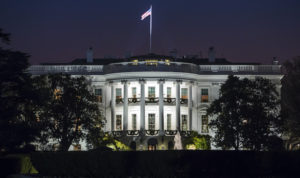
President Biden reverses Trump-era policies, President Trump issues last-minute executive orders, and more…
IN THE NEWS
- President Joseph R. Biden was sworn in as the 46th President of the United States, addressing the nation in a speech that sought to unify a country divided by a fraught election and a worsening pandemic. Within hours of his inauguration, President Biden issued a flurry of executive orders on a range of policy issues, including rejoining the Paris Climate Agreement, revoking the Trump Administration’s ban on immigrants from various Muslim-majority countries, and mandating mask-wearing on all federal property. The President devoted a portion of his 21-minute inauguration speech to offer a silent prayer for the 400,000 Americans who perished this year during the coronavirus pandemic, calling on the country to “honor them by becoming the people and nation we know we can and should be.”
- Days before his term ended, President Donald J. Trump issued an executive order to protect Americans from “unwarranted criminal punishment for unintentional violations of regulations.” Declaring it unfair to subject people to criminal prosecutions for violating regulations that are difficult to understand, the President ordered agencies to specify what conduct is punishable and whether a conviction requires an intentional violation when issuing new regulations with criminal penalties.
- President Donald J. Trump issued an executive order that requires senior presidential appointees rather than non-appointed career officials to initiate rulemakings. Arguing that presidentially appointed agency officials are more accountable to the American people, President Trump asserted that allowing non-appointed career officials to direct the rulemaking process “undermines the power of the American people to choose who governs them.”
- President Biden reportedly plans to propose legislation that would create a path for undocumented immigrants to recieve citizenship. The legislation would allow those in programs that prevent deportation but do not grant citizenship, such as Deferred Action for Childhood Arrivals, to apply for citizenship immediately. The legislation would also expand the refugee and asylum programs that the Trump Administration weakened. In addition to expanding pathways to citizenship, the legislation would allocate funding to Central American countries, increase work opportunities for immigrants, and rely on enhanced technologies rather than a physical wall for border security.
- The U.S. Census Bureau announced that it would not release data used to apportion congressional seats before the inauguration of President Biden, effectively defeating the Trump Administration’s efforts to exclude undocumented immigrants from the census count. In a federal court order, attorneys representing the Census Bureau agreed that the Bureau would not finalize or publicly release the census data before January 20, giving the Biden Administration the opportunity to reverse course on a Trump Administration policy that President Biden has previously condemned. In a statement, Dale Ho, director of the American Civil Liberties Union’s Voting Rights Project, said that President Trump “tried and failed throughout his entire presidency to weaponize the census for his attacks on immigrant communities.”
- A Southern California air quality regulator issued an emergency order suspending permit limits for Los Angeles County crematoria in response to the growing backlog caused by the coronavirus pandemic. Due to unprecedented death rates in the region, local public health authorities had requested that the agency temporarily lift its cremation limits. Responding to the slow rollout of vaccinations in the county, Barbara Ferrer, director of the Los Angeles County Department of Public Health, cautioned that residents should continue to take precautions to avoid contact with individuals outside their households, saying that “it will take a number of months to reach the level of vaccination needed in the population to curb ongoing transmission of the virus.”
- President Biden announced his nomination of Rachel Levine as assistant secretary for health of the U.S. Department of Health and Human Services. Levine currently serves as the secretary of health for the Pennsylvania Department of Health and, if confirmed, will be the first openly transgender federal official confirmed by the U.S. Senate. President Biden stated that Levine will support all Americans during the pandemic, regardless of “zip code, race, religion, sexual orientation, gender identity, or disability.”
- The College Board announced that it will discontinue the SAT subject tests and the optional SAT essay. It also announced plans to develop a digitally administered SAT. Many students have been unable to take the SAT and SAT subject tests due to testing location closures or COVID-19 exposure concerns. The College Board asserts that offering fewer tests that students may feel compelled to take will help “reduce and simplify demands on students.” Jon Boeckenstedt of the Oregon State University reportedly characterized the decision as an attempt to save costs.
WHAT WE’RE READING THIS WEEK
- In a forthcoming article for the Indiana Law Journal, Christopher Yoo, professor at the University of Pennsylvania Law School, and law student Kellen McCoy analyzed the conflicting obligations that agencies must uphold in informal rulemaking proceedings. On the one hand, Yoo and McCoy acknowledged that agencies have an obligation to conduct informal proceedings transparently. Yet at the same time, agencies also have a statutory duty to safeguard proprietary business information. Yoo and McCoy offered several recommendations to reconcile these competing obligations, ultimately recommending that agency policies favor disclosure as the default.
- In a recent essay, Travis Reginal, research associate at the Urban Institute, argued that schools should address racial and ethnic disparities to support students of color. Reginal explained that, because students of color are often treated differently than their white peers, it is important to take steps to mitigate racist actions and create a school environment where students do not worry about unfair treatment due to their race. School can improve the educational environment, Reginal suggested, by diversifying teaching staff, increasing resources for students who may face trauma, and providing more training for teachers. Reginal urged that researchers need more data to understand how the experiences of students varied by race and ethnicity to help improve schools for students of color.
- In a recent paper, Olatunde C. Johnson, professor at the Columbia University Law School, offered a framework to harness the integration benefits of gentrification while mitigating the frequent displacement of low-income individuals. Johnson suggested that the Fair Housing Act can be wielded to lessen discrimination in gentrified cities but fails to address broader issues of inequality. Johnson argued that cities must redistribute public goods, hold developers accountable, and increase the political voice of those most affected by gentrification.
FLASHBACK FRIDAY
- In an essay in The Regulatory Review, Daniel Kees, former senior editor of The Review, argued for stronger regulations to combat the sale of antiquities to finance terrorist activity. Kees explained that ISIS generates revenue by looting and selling priceless cultural artifacts to mostly Western buyers. Kees argued that current statutes and regulations are insufficient to limit antiquities sales because there is no single legislation that exclusively governs the trafficking of these artifacts. Kees recognized, however, that no single fix will stop the evolving antiquities trafficking industry and urged for stronger regulations that emphasize the liability of buyers, sellers, and intermediaries



